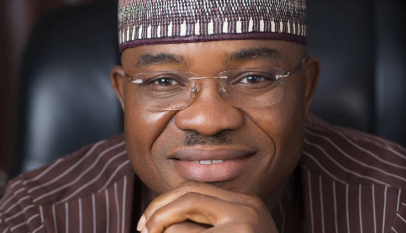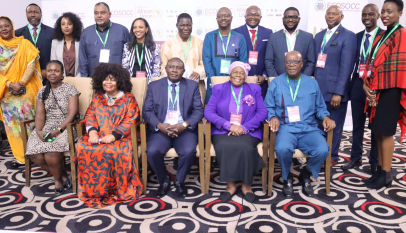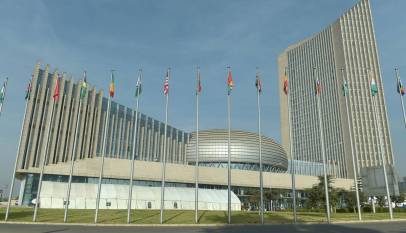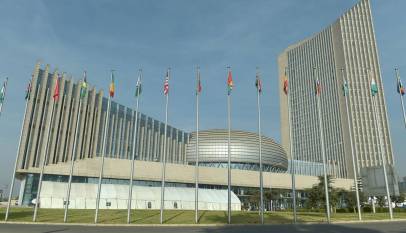ANALYSIS | Why is Nigeria foot-dragging on the AfCFTA?
As Africa’s biggest economy, Nigeria’s sluggishness in signing the AfCFTA and its subsequent failure to ratify the agreement over a year later, is a major concern among stakeholders in the AfCFTA process

In a bid to bridge the huge gap in intra-African trade, thanks to numerous tariff and non-tariff barriers, the African Continental Free Trade Agreement (AfCFTA) was created and signed by Member States of the African Union on 21st March, 2018, in Kigali, Rwanda. As of September, 2020, 54 out of the 55 African Union countries had signed the Agreement with Eritrea being a single exception.
The AfCFTA seeks to establish a single continental market for goods and services, increase intra-African trade by cutting tariffs by up to 90% and harmonizing trading rules at regional and continental levels. Trade among African countries is currently placed at a paltry 16%, compared to 70% in Europe, 60% in Asia and 30% in North America.
By the number of its participating countries, the AfCFTA is said to be the world’s largest free trade zone since the establishment of the World Trade Organization in 1994. Thus, it is expected to create opportunities for African countries to freely trade with one another by allowing free movement of people, goods and services, as similar Free Trade Areas (FTAs) have done in other regions of the world.
Subsequently, experts believe the Agreement will usher in an era of growth, jobs and wealth creation in Africa by creating a continental market for its 1.3 billion people worth USD3.4 trillion, boosting intra-African trade by between 53 and 60 percent by 2022. However, despite the huge opportunities for economic growth the AfCFTA presents to African countries, its most populous nation cum largest economy – Nigeria – seems to be exceedingly reluctant to ratify the Agreement.
“After signing [the AfCFTA] our expectation was that the Nigerian government would activate the ratification process, immediately, since according to Section 12 of the Constitution of the Federal Republic of Nigeria, no international treaty can become law until two-thirds majority of the National Assembly passes it,” says Sand Mba, executive director of the Africa International Trade & Commerce Research (AITCR). “I can’t imagine why Nigeria is refusing to follow this process since without ratification it cannot be considered as a state party to the AfCFTA.”
Nigeria’s protectionist policies
With an estimated population of over 200 million people and a GDP of around USD450 billion, Nigeria is both Africa’s most populous nation cum its biggest economy. Consequently, it offers viable market opportunities, a sizable customer base, and high purchasing power – compared to other African countries. Therefore, as far as the AfCFTA Agreement is concerned, Nigeria can simply not be ignored!
Despite its strategic economic position in Africa including a relatively vibrant industrial base, Nigeria has of recent been increasingly gravitating towards protectionist trade policies. To begin with, Nigeria was the 53rd out of 55 AU Member States to sign the AfCFTA Agreement. Shortly after signing the Agreement in July 2019, Nigeria had shut down its land borders against its ECOWAS neighbors: Benin, Niger and Cameroon, banning all forms of import and export, justifying its action with the need to curb the smuggling of foods, drugs and arms.
Yet, Nigeria’s unilateral border closure was an unambiguous contravention of the principles of both the AfCFTA and West Africa’s Protocol Relating to Free Movement of Persons, Residence which draws its legality from the 45-year-old treaty of the Economic Community of West African States (ECOWAS), whose birth Nigeria had spearheaded with its “diplomatic, economic, and intellectual leadership”. Although it only signed the Agreement on the eve of its coming into force and had not yet ratified it, Nigeria staged a contentious but unsuccessful diplomatic battle for the secretary-generalship of the Accra, Ghana-based AfCFTA secretariat.
Reginald Nnabue, a Nigerian industrialist, thinks the Nigerian policymakers and business community’s apprehension on the AfCFTA is based on a “false narrative of a nation rich enough to survive on imports”, which he said was born out of a narrow-minded view of Nigeria’s leadership responsibility in Africa.
“Nigeria ought to be the torchbearer of Africa’s path to self-sufficiency and reliance. But because Nigerian leaders are still lost in the ignorance of the principles of wealth creation – which is basically jobs creation through ensuring value addition to all of the nation’s natural resources before exports – Nigerian leaders are not seeing the enormous market opportunity to be met with byproducts within the FTA. Nigeria must stop looking at AfCFTA from a buyer’s standpoint, and instead begin to look at it from a seller’s viewpoint,” said Nnabue.
Why is Nigeria afraid of the AfCFTA?
In December, 2019, while launching the National Action Committee for the Implementation of the AfCFTA – saddled with the responsibility of engaging various stakeholders in the Nigerian economy on the opportunities and challenges presented by the Agreement – President Muhammadu Buhari had described Nigeria’s approach to the FTA as “very measured and consistent”.
“Our logic was simple, as Africa’s largest economy and most populous nation, we cannot afford to get it wrong,” Buhari said. “We also conducted a rigorous impact and readiness evaluation. It was after these consultations and studies, and satisfactory reports that I signed the African Continental Free Trade Area Agreement on behalf of Nigeria in July this year. We know the benefits and understand the challenges. It is clear that for us to fully benefit from this agreement, we must have an implementation programme that reflects our national trade objectives and development plans.”
Several factors have been attributed to Nigeria’s endless delay in ratifying the Agreement, namely concerns about issues such as the rise in smuggling, import surge arising from trade liberalisation without corresponding growth in export of Nigerian products, and ultimately, the fears that the deal will turn Nigeria into “dumping ground” for non-African goods. “I don’t think Nigeria has the capacity to effectively supervise and to ensure that our colleagues in AU don’t allow their countries to be used to dump goods on us to the detriment of our young industries and our capacity to utilise foreign exchange for imported goods,” Buhari had said.
However, Mba believes there was no need for apprehension since the AfCFTA is a rules-based trading system, one that has adequate provisions to address the challenges of Rules of Origin (RoO), re-export, dumping and trade remedy concerns. “AfCFTA will afford Nigeria the opportunity to become a trading hub in Africa. Nigeria is in a better position to benefit from the AfCFTA – however, we have to address our infrastructure challenges, especially power, if we intend to maximise the opportunity of the AfCFTA.
“The Nigerian government should update our national trade and industrial policy to support the growth of our service and manufacturing sectors and attract private sector investment that will boost industrialisation. The Nigerian government, policymakers and the business community should prioritise, develop, and implement comprehensive strategies that will take advantage of the rising opportunities in manufacturing and industrialisation across the various value-chains to increase the competitiveness of Made in Nigeria goods, instead of dwelling in fear,” urges Mba.
Relatedly, Niyi Adebayo, Nigeria’s minister of trade cum chair of its action committee for the AfCFTA, while speaking to CNBC Africa in March had said Nigeria became one of the last countries to sign the Agreement because being the biggest single country market under the CFTA, President Buhari was “a bit concerned it might impact negatively on Nigeria’s industry”. “We are looking at how we can take advantage of the Agreement. We are sitting with our industrialists so they can point out where they feel we might be at a disadvantage and we will negotiate with the other countries to see how we can have a level-playing field so that no one is disadvantaged.”
Adebayo said Nigeria was particularly concerned about issues like Rules of Origin so as to avoid a situation whereby the country would become a dumping ground for non-African goods. “Some countries might import things from China, for instance, into their countries for on shipment to Nigeria, which is the biggest individual market in the whole of Africa. I [therefore] promised Mr President: ‘I will make sure we will not recommend the ratification of that Agreement until we are sure we have done enough to protect the Nigerian industry,’” he vowed.
Nnabue disagrees. “Nigeria is still dragging its feet because our leaders are still viewing the AfCFTA from the perspective of a nation plagued with and still addicted with Western imports – and not a proactive African Giant saddled with the responsibility of inspiring the African Industrial Revolution. Nigeria must look at the AfCFTA from the position of a supplier, and not the supplied. The onus of meeting the demands of a well implemented AfCFTA is the greatest industrialization opportunity of all African nations, especially Nigeria, in view of the strategic place the country occupies in terms of human resources, along with abundant natural and mineral resources.”
AfCFTA: Nigeria’s opportunities and challenges
Current statistics show Nigeria is not maximising its export potentials in the non-oil sector with oil exports constituting 94% of its total exports in 2018. According to the African Development Bank (AfDB), the AfCFTA will stimulate intra-African trade by up to $35 billion per year, creating a 52 per cent increase in trade by 2022 as well as decreasing imports from outside Africa by $10 billion. Thus, the AfCFTA presents an incredible opportunity for Nigeria to boost its non-oil exports and services across the continent, which will subsequently help attract more Foreign Direct Investment (FDI) and reduce unemployment rates in the country.
Mba thinks Nigeria’s economy is constrained by systemic and structural challenges to do with policy inconsistency, bureaucratic bottlenecks, poor infrastructure, insecurity and over-reliance on crude oil export as a major source of government revenue; he however says the AfCFTA comes with numerous benefits for Africa’s biggest economy such as increasing participation of Nigerian women in cross-border trade.
“AfCFTA will remove the barriers preventing women from formalising their cross-border trade; boost intra-Africa supply and demand value-chain for Small and Medium-Term Enterprises (SMEs). The AfCFTA will create an opportunity for easy mobility of skilled Nigerian labour across borders which will result in increased mobility of labour across African markets as well as the transfer of knowledge and investment leading to more job opportunities for Africans who are able to move freely from one country to the other in the pursuit of job opportunities.”
As a result, Mba believes the AfCFTA Agreement will turn the whole of Africa into a very large economic bloc where trade, people and investment can move freely from one part of the continent to the other with little or no barriers.
“The implication is that locally produced goods and services will freely compete across African markets without any corresponding trade restrictions from recipient countries, thus, boosting each country’s GDP. African consumers will have access to more African goods and at relatively lower prices. Small and big Nigerian businesses likes Innoson Motors, Dangote Industries, African Textile Manufacturers, Pamol Nigeria, and Vitaform, among others, will benefit from the AfCFTA as they will gain more traction in the sales of their products to readily awaiting 1.3 billion consumers,” he said.
A postscript
The AfCFTA will certainly transform intra-African trade, promote economic and industrial development of the continent. However, the recurrent theme in discussions about the AfCFTA in Nigeria remains the need to improve infrastructure, strengthen the local manufacturing industry, improve security, ease of doing business and boost the country’s competitiveness ahead of the full operationalization of the Agreement come January 1, 2021. For Africa to maximize the benefits of the CFTA, adequate preparation and capacity building is required at the level of both Member States and Regional Economic Communities (RECs).
Even though many of its concerns could be justified, Nigeria’s lackluster attitude toward the AfCFTA points to its increasingly receding and dissipating role as shaper of Africa’s destiny. Gone are the days when Nigeria takes the lead on all matters African – and its foreign policy is Afrocentric. Although understandably crippled by internal challenges particularly the decade-long Boko Haram insurgency, Nigeria’s continues recoiling into its shell is a major concern for Africa as it prepares to kick-start trading under the AfCFTA.
Nnabue believes the AfCFTA represents Africa’s race towards industrialization, in which Nigeria must not be missing adding that until the country abandoned local production and consumption in favour of foreign goods, Nigeria used to manufacture majority of its consumption needs, making it a hub of job opportunities for not only Africans but also Indians, Chinese, Lebanese citizens.
“The AFCFTA presents Nigeria with the opportunity to produce made in Africa goods and services, returning the country to her erstwhile enviable position of a producer nation. A wholehearted view of the AfCFTA by the Nigerian leadership would be a necessary incentive towards building the local industrial capacity that Nigerians have been yearning for. The fact that the CFTA is the world’s largest FTA is phenomenal: it is the best thing that has ever happened to Africa,” he argued.
“This state of affairs contrasts sharply with Nigeria’s prior activist roles on matters African in years gone by. In the past, Nigeria has used its political heft, economic power, and diplomatic and intellectual pedigree to seize the mantle of leadership that changed the course of African history,” wrote Aloysius Ordu, director of the Africa Growth Initiative at Brookings Institution. “Africa needs an engaged and proactive Nigeria. To turn inward and be on the sidelines of history is clearly not a viable option for the continent’s largest economy. The time for action on the AfCFTA is now. Africa’s destiny depends on it.”















